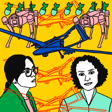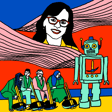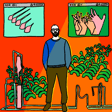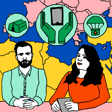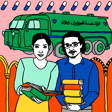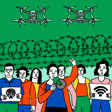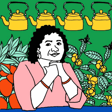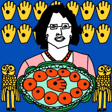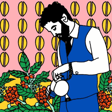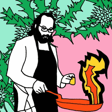Become a Creator today!Start creating today - Share your story with the world!
Start for free
00:00:00
00:00:01

2.5 Food as a human right with Michael Fakhri
‘UN Special Rapporteur on the Right to Food’ - who wouldn’t want that job title? When we read about Michael, we knew we had to interview him to learn about what he had to do to get this cool job and to know what it actually entails. He talked to us about why food is a human right and how he uses the case of Lebanon, his home country, as a sounding board for his right to food questions.
Find Michael on Twitter: https://twitter.com/MichaelFakhri
Transcript
The Right to Food: Beyond Government Action
00:00:00
Speaker
The right to food is something you don't have to wait for the government to put into law, nor do you have to necessarily campaign to put it on the books. It is all of our right to take into our own hands. So the place to start, whether it's Lebanon, whether it's the Arab world, whether it's any country in the world today, is you start with social movements, movements where people are representing themselves in their own interests, whether it's farmer movements,
00:00:28
Speaker
peasant movements and the labor movement. Trade unions are key, I think, from that ground up, articulating what the right to food means in that specific context of each country. This is season two of Instant Coffee, where we explore everything related to food in the Middle East. I'm Nadine Almanasvi. And I'm Rivaazlehman Haydar. And together, we want to understand how food is shaping people's writing, thinking and organizing in the region.
UN's Role in Promoting Food Rights
00:01:00
Speaker
On this episode, Director of the Middle East Centre, Michael Mason, will be in conversation with our next guest, Michael Fakhri. Michael Fakhri holds the very unique title of UN Special Rapporteur on the Right to Food. He is also Professor of Law at the University of Oregon, teaching and researching on food policy, third-world approaches to international law, agro-ecology and development in the Middle East. In this episode, Michael speaks to us about what promoting and protecting people's right to food at the UN actually involves.
00:01:30
Speaker
Welcome, Michael, to this Instant Coffee podcast. And I thought a good place to start perhaps is just to say, what is the right to food? So in the sort of most narrow form, the right to food is a very broad right. So it's more than about hunger. It's more used in the old days. It was about being free from hunger. But the right to food means that everyone has a right for food to be accessible.
00:01:54
Speaker
available and adequate food, but rather than going through the technical details about what all of those mean, I think a handier or more accessible way to think about the right to food is that the right to food is everyone's right to celebrate life through their meals with each other in communion.
Reframing the Right to Food
00:02:12
Speaker
That's interesting because that seems that sounds to me that it has a sort of broader social and cultural meaning and simply the access to sufficient nutrition
00:02:22
Speaker
Exactly. I mean, if you think about just how we eat every day, it's how people define themselves, they define their community, it's how we stay connected to our communities. As someone who's migrated his entire life, it's a way of connecting with who we are, regardless of where we live.
00:02:39
Speaker
It's also about how we relate to the land, into water, and to the biosphere more broadly. So how we eat is always very cultural, very political. And the part that's also very important, it's pleasure. And pleasure is important in life. It's not secondary. How we derive pleasure from each other's company and from those relationships, I think, is the key to think about how food is central to our human rights and our sense of dignity. Now, when we talk about a right to food, a right, as you said there,
00:03:09
Speaker
This sounds as if it's something we can talk about as a human right, as some kind of entitlement. What's the kind of challenge in thinking about the right to food as a particularly human right? The right to food in a human rights way of thinking is different than food security, and it's different than the charity model. Those are the two other more popular ways.
00:03:32
Speaker
Food security is a term that really becomes popular in the mid-70s when there was a big famine crisis. And at the time the term security was added onto food was to highlight how important food is in political terms, how important food is to maintain stability and safety and our sense of political stability at the time. And so it had a lot of power when it was framed in terms of food security.
00:03:58
Speaker
But what happened over time is then food security became a very narrow term. And it was about just really thinking about availability of food, producing more food. You know, now people are more aware of the nutritional elements, but it really leaves out the aspect of everyday life of that food is what our people are entitled to. And food is the power should be in the hands of the people, that the idea is that experts should be serving the needs and demands of people.
00:04:27
Speaker
Whereas food security really tends to prioritize expertise that the nutritionist or the expert or whoever tells people what they should be eating. So that dynamic is different. The other approach is a charity model where people with power and plenty
00:04:44
Speaker
because of the benevolence of their position, decide to give people food. And the model there often is food banks. And food banks do an important job in helping people in the immediate term. But it doesn't provide a systemic change that people need. And the problem with the charity mode is it just reaffirms existing power structures. Again, it doesn't put the power in the hands of the people.
Agroecology and Climate Change
00:05:08
Speaker
I'm a geographer and so one thing I'm interested in is issues like environment and climate change and I imagine that there were great pressures on global food systems at the moment.
00:05:20
Speaker
And is that something that you look into in terms of your work for the UN as a special rapporteur? Most definitely. One of the main reasons is because the current system of food and agriculture we have in the world that is the primary system is a big contributor to climate change. So a significant amount of greenhouse gases are produced by
00:05:44
Speaker
the agricultural sector and the food sector more broadly, but it's a very specific type of system that's the problem. And it's a system that's very intensive in terms of its input. So the amount of fertilizer that's used, the amount of capital that's used,
00:06:01
Speaker
The amount of money and all of that is very intensive at the front end. And it's very much a model, this very industrial model, this idea of input and output. The idea is the more input you put, the more output you get. And that's not a normal way of thinking about food. Food is in our biosphere. Food is part of the ecological processes.
00:06:22
Speaker
It's not input output. It's actually a cycle. So what an industrial agriculturalist would call output, we would call fertilizer. So the idea of when is waste a problem and when is waste reincorporated back into the biological system are two different approaches. So the approach that has dominated since the 1970s has been part of the problem. Now, there's a new consensus, OK, we have to do something different.
00:06:51
Speaker
And some people are, I think, are just kind of tinkering at the margins, sort of reforming things, whereas other people are using human rights to bring a more transformative vision. So you hear terminology like agroecology, the idea of approaches, and these are the approaches that have been developing, but they're also building on traditional approaches from the past.
00:07:13
Speaker
The idea of let us mimic ecological processes and let us prioritize knowledge from the farmers, the fishers, the pastoralists, the indigenous peoples themselves, and that the role of the scientific community or I would call it experimental knowledge, the scientific community, is to serve the farmers, serve the indigenous people, serve the pastoralists.
00:07:35
Speaker
So that human rights approach is gaining more popularity, gaining more traction and to transform the food system in a way that mimics ecological processes and also sort of embedded in practices on the ground. Absolutely, Michael. Yeah.
00:07:50
Speaker
That takes us, I think, into talking about your work as UN Special Rapporteur on the right to food. I think a podcast audience would be very interested to see or to hear. What does that work involve for you? Yeah, so I started this position May 1st, so I'm coming up to my one-year anniversary and I start in the midst of a pandemic. So I also think I'm
00:08:13
Speaker
It's a more of a, I don't think I'm the regular type of rapporteur. Those of us that started within this year have a particular experience. But generally speaking, special rapporteurs are independent experts and we're given authority by the UN Human Rights Council. So the Human Rights Council is the highest UN authority on human rights.
00:08:34
Speaker
And we apply. I filled out an application. And based on everyone's expertise and their knowledge, you're given a mandate. So my mandate is the right to food. It's a very broad mandate. And my job, as my name indicates, is to report. It's to highlight what's going on in the world, to conduct country visits, to consult experts, to consult civil society, advocacy groups, social movements, trade unions. So a lot of my job is listening.
00:09:00
Speaker
And it's also bearing witness to what's going on in the world and finding a way to report not just back to the Human Rights Council or to the General Assembly. Those are the formal bodies that I'm accountable to, but also to the public at large. How can I report out and tell the story of what's going on in terms of hunger, nutrition, and everyday life? And highlighting people's struggle, but also people, what they're doing right, what is working.
00:09:28
Speaker
So it's not just about pointing out violations by countries. That's a core aspect of what I do, pointing out when countries are not meeting their legal obligations, but also highlighting what's working well.
Lebanon’s Influence on Food Rights
00:09:41
Speaker
And for me, the most important job, again, is listening, bearing witness, and then telling that big story for everyone to hear.
00:09:49
Speaker
Somebody, you know, coming from Lebanon, let's move on to the region, shall we? How does that kind of inform your work, you think, as Special Rapporteur? So there's the element of how it was informed my work coming in. And then there's this specific situation of Lebanon today, which is even worse than when I started a year ago.
00:10:09
Speaker
So I think the history of Lebanon has, for the longest time, for at least I would say 200 years, is a history of migration. People coming and going on a regular basis through Lebanon, from Lebanon, back to Lebanon. And my personal history is very similar. And inevitably part of being a migrant, and this isn't just being Lebanese, is just the preoccupation with food. So I came into the world of food and food research
00:10:36
Speaker
partly because when I was doing my PhD, the advice I was given is like, all writers write what you know and you better be passionate about your topic because the PhD is a long and difficult slot. And I realized when I called friends all over the world, often before we would say hello, we would talk about what did you eat and how did you cook it and do you remember how this was made and what's your recipe for this or that?
00:11:01
Speaker
And I realized how food was so important to me, so I was looking for something. So food for me already was just a political topic, an everyday topic. It's a topic that allows one to understand everything that's going on in the world. And then, so when I got this position, what was happening in Lebanon, more specifically the uprising in October, last October,
00:11:25
Speaker
was profound. It was inspiring. It was intense. It was a moment in Lebanese history where everyone looked at each other for the first time, not in sectarian terms, not in terms of legal status or citizenship. But truly, as we are all sharing this space, we have to live together differently and we have to interact face to face. That moment was this moment of pure elation.
00:11:51
Speaker
And of course, now things have changed since then, but that spirit of the October uprising, that spirit of people coming to the streets, seeing each other as people and working together, I want to sort of carry that spirit with me into the position. That's when I started, I thought, my God, if they could do this in Lebanon, that shows that there's hope against all cynicism, against all violence and all of that.
00:12:18
Speaker
And I never use language of success or failures with uprisings or revolutions or popular movements. It's more about how people have changed after this moment and people have changed. Now, of course, the situation in Lebanon is getting worse. And so I always start thinking with solutions and ideas with this work in Lebanon. And that's a proxy for me in this sense.
00:12:39
Speaker
Lebanon is a country like many countries. So there is the unique aspects, but it's a country where the national government is not serving the people. There's that element. And that's no longer just an Arab country thing or a developing country thing. I think what we've seen with COVID and with climate change, most governments are not meeting their obligations. Most governments are not doing their job.
00:13:02
Speaker
developed countries, rich countries, poor countries. But Lebanon, in my mind, is this is what will happen in the worst case scenario to everybody. So you have a national government that's not responsive to its people. You have a financial system that's not working, much like the global financial system failed in 2008, right?
00:13:19
Speaker
And you have an international system that's not serving the people either. So nothing about the international human rights system or financial system has served people in Lebanon in any way. I keep thinking, what would a right to food program look like for people in Lebanon? Combine that with my experiences of consulting with different social movements.
00:13:39
Speaker
And for me, the right to food is something you don't have to wait for the government to put into law, nor do you have to necessarily campaign to put it on the books. It is all of our right to take into our own hands. So the place to start, whether it's Lebanon, whether it's the Arab world, whether it's any country in the world today, is you start with social movements, movements where people are representing themselves in their own interests, whether it's farmer movements,
00:14:09
Speaker
peasant movements and the labor movement. Trade unions are key, I think, from that ground up, articulating what the right to food means in that specific context of each country. So I'm not just seeing it in Lebanon, we're seeing it in India, we're seeing it in Scotland, we're seeing it in the United States, in Ecuador, this idea of people defining for themselves what the right to food means, I think is the way to go. And so again, I always start in Lebanon, will this work in Lebanon?
00:14:38
Speaker
and I pull out to the rest of the world. The other thing I've seen in Lebanon is how quickly hunger strikes. The historical trend, and this is building on the work of Amartya Sen, hunger and famine is never a problem of lack of food. It is always the result of political failure. And hunger is on the rise all over the world. It was on the rise before the pandemic. So that tells me that our political and economic system was not working before the pandemic, and it's even worse today.
00:15:08
Speaker
As with audio, Marco, you can't see my head nodding up and down approvingly. That's what I was saying, but here it is.
00:15:17
Speaker
Luckily enough, I've read an article you're publishing for the legal agenda. I was really interested by this argument that you just relayed about how you see this sort of food sovereignty sort of politics arising from the bottom up, as it were, in terms of these sort of social political coalitions which use
00:15:43
Speaker
much more than we have in recent years, this outreach to small producers. And I wondered in terms of the both perhaps the challenge in the region and perhaps more globally, whether the pandemic has given us an opportunity to go forward in that sense, in that direction more positively perhaps, or maybe it's holding us back.
00:16:07
Speaker
I'm going to take the opportunity of having you, Michael, as a geographer. I mean, the first thing is whatever we say, the region, that's so in any region, it's complicated, there's history, there's politics. I've heard, I think this is Sameer Asir, a Lebanese journalist and intellectual who's assassinated.
00:16:26
Speaker
He said the problems in Lebanon are geographical. To understand Lebanon, you actually have to understand geography before history, and we could talk about those two things. And so what we're seeing with
Global Solidarity and Food Sovereignty
00:16:38
Speaker
COVID, what we're seeing in Lebanon, is our sense of space. Lebanon is not just the formal boundaries, which all have been significantly contested since independence.
00:16:48
Speaker
Lebanon is also the diaspora. Lebanon is also the migrant labor that lives in Lebanon that is in a very precarious situation. So the geography of any country of one country will pick Lebanon as an example. Looking at the borders doesn't tell you too much. It's a rough start.
00:17:08
Speaker
And so, I think those solutions have to allow us to think in terms of different spatial networks and how people work together. So, the frustration in Lebanon is well whenever the inner the so called international community comes they make a mess of things.
00:17:24
Speaker
Nevertheless, people in Lebanon need help from somewhere. People are so exhausted and hungry and tired. Where is that somewhere going to come from? Food sovereignty might have an answer. And the right to food might have an answer. There are strong food sovereignty networks of other farmer groups, other peasant groups, other trade unions that have a sense of not the region, but the same geography.
00:17:52
Speaker
you know, bring in peasants that understand citrus and olives and mountain climates and where mountains meet ocean and the valley and the very specific geographical concerns, that becomes a very different spatial politics in play, right? And the Food Sovereignty Network and the trade unions globally
00:18:13
Speaker
have that expertise. So it becomes a people to people way of thinking about solutions and solidarity. And that's the concept that I sort of find hope in terms of outside support is I don't think it's going to come from the UN or from other countries. It's going to come from these solidarity movements coming out of food sovereignty. Unfortunately, we've had our time, Michael, but I think that's a wonderful way to end with that sort of invitation to think about this issue in terms of
00:18:43
Speaker
global solidarity and empowerment, and particularly in terms of small producers and those that work on the land and those that live on the land and how they can join together with those of us who live in cities for a more just food future. I wanted to thank you very much, Michael, for joining us on this Instant Coffee podcast. It's been my pleasure, Michael, and I look forward to having a proper cup of coffee with you face to face. Absolutely. Thank you. Bye bye.
00:19:11
Speaker
Thank you for tuning into Instant Coffee, a podcast brought to you by the LSE Middle East Center. Join us every other Tuesday for a new episode of Instant Coffee. To learn more about Michael and his work, follow the links in the podcast description. Don't forget to follow us on Instagram and subscribe to our channel wherever you get your podcasts. Please make sure to like, comment and give us five stars.

